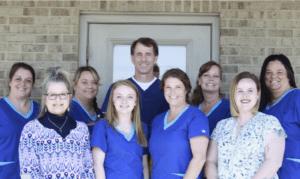Sleep apnea is a common and potentially serious sleep disorder that is characterized by repeated pauses in breathing during sleep. While it’s estimated that well over 20 million Americans suffer from sleep apnea, most of them likely don’t know, as it can manifest across a spectrum of mild to severe.
Sleep apnea can have a significant impact on overall health, including oral health. In this article, we will explore the link between sleep apnea and oral health, including how it can affect the mouth and teeth, and how good oral hygiene and treatment can help improve your health as a whole.
What is Sleep Apnea?
Sleep apnea is a sleep disorder that occurs when a person’s breathing is repeatedly interrupted during sleep. These interruptions, called apneas, can last from a few seconds to several minutes and can occur up to hundreds of times per night. They are usually caused when the muscles in your mouth and throat relax, temporarily obstructing your airway.
Symptoms of sleep apnea include:
- Fatigue
- Snoring
- Waking up with a dry/sore throat
- Waking up suddenly gasping/choking
- Changes in mood
- Hypertension
- Headaches
- Difficulty concentrating
What Causes Someone to Develop Sleep Apnea?
Sleep apnea may have a biological cause, but there are also health and lifestyle factors that may affect whether or not someone will develop sleep apnea. Depending on the cause, this sleep disorder is sometimes reversible. However, if the cause is biological, treatment is often ongoing and permanent.
Endemic risk factors for sleep apnea include:
- Structural problems in the sinuses
- Enlarged tonsils
- Small or receding bottom jaw
- Family history of sleep apnea
- Oversized uvula
- Large tongue
Health and lifestyle factors that can put you at higher risk for sleep apnea include:
- Over the age of 40
- Have congestive heart issues
- Have had a recent stroke
- Smoke
- Take narcotics
- Regularly consume alcohol
- Nasal congestion
- Overweight/Obese
There are 3 types of sleep apnea, categorized by their causal mechanisms:
- Central sleep apnea: When the brain fails to properly activate muscles involved in breathing during sleep. This type of sleep apnea is often comorbid with another neurological disorder.
- Obstructive sleep apnea: The most common type of sleep apnea (80%+ of cases), OSA occurs when the soft tissues in your mouth and throat – like the soft palate and tongue – relax too much, making your airway too narrow. As discussed above, these can have natural or lifestyle causes.
- Complex sleep apnea: Diagnosed when the symptoms continue even after the airway issue has been resolved.
What are the Long-Term Effects of Untreated Sleep Apnea?
The dangers of sleep apnea are multifaceted, because we’re dealing with the respiratory, sinus and oral systems, and we’re compounding chronic sleep disturbance on top of it. As a result, sleep apnea poses threats to all the vital systems in your body, increasing risk of:
- Hypertension
- Diabetes
- Stroke
- Heart disease
- Shortened lifespan
- Oral pathologies
When your breathing is consistently and irregularly interrupted, it puts stress on your vascular system and your heart. This undue stress compounds, which is why one thing can lead to another, and what started as a mild case of sleep apnea can spiral into a host of very serious health issues, including difficulties with your oral health.
How Does Sleep Apnea Affect Your Oral Health?
Although sleep apnea has a clear effect on your overall health, it also causes issues with your oral health. If you are experiencing any of the issues listed below despite a stellar oral care routine, sleep apnea could be the culprit.
Teeth Grinding & TMJ
Oftentimes when a relaxed tongue is causing air obstruction, it causes you to unconsciously clench your jaw and grind your teeth. It’s a survival mechanism to prevent the airway from closing. Although this might help you breathe better, it can also cause your teeth to wear down or even develop cracked tooth syndrome, where your teeth are riddled with micro cracks. Worn-down teeth can cause further damage such as decay, cavities and tooth loss.
As well, bruxism can lead to TMJ. Undue clenching of the jaw puts stress on the temporomandibular joint. This stress can cause the joint to become stiff, seize, or even damage the joint’s structure. This leads to painful chewing, swallowing, chewing, and even breathing. It can also cause clicking and popping in the jaw, which can cause the jaw to lock unexpectedly.
Dry Mouth & Tooth Decay
Sleep apnea normally causes you to sleep with your mouth open, because throat passages are wider than nasal passages. Breathing with your mouth open causes dry mouth. Symptoms of dry mouth include plaque, cavities, tooth decay, gum disease, infections, and mouth sores.
The reason dry mouth and tooth decay go hand-in-hand is because your saliva serves as a constant tooth rinse; protecting you from the buildup of gross stuff and exposure to environmental bacteria. These issues can be treated by your dentist, however, they are likely to return unless you treat the root cause.
How Your Oral Surgeon Can Help You Protect Your Oral Health
Addressing the underlying issue is the key to properly treating an oral pathology, so treating your sleep apnea may be the answer to chronic issues like dry mouth or TMJ. The main course of treatment is a CPAP machine, which creates continuous positive pressure through your airways, keeping them open. But other dental treatments may serve as alternatives, including oral devices that can support and prevent an obstructed airway.
In addition, always take great care of your mouth and jaw, and don’t skip those 6-month cleanings and exams! Preventative care is always important, but even more so when you’re dealing with concurrent health problems, too.
Sleep apnea can have a significant impact on oral health. The issues it can cause can lead to a variety of oral health problems. It is important to be aware of the link between sleep apnea and oral health and to seek treatment if you are at risk or experiencing symptoms. Addressing the root of the problem can not only improve your oral health but also your overall health and quality of life.









